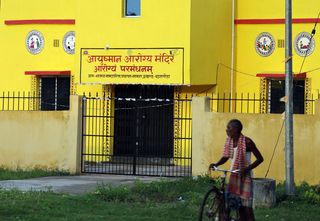Access to quality health care is a fundamental right enshrined under Article 21 of the Constitution. But, in a country as vast and diverse as Bharat, ensuring equitable access to health care for all remains a formidable challenge.
Government hospitals, which for the economically disadvantaged are generally the only option for treatment, are burdened by overwhelming number of patients, leading to longer wait times and overextended staff. On the other hand, while private hospitals offer advanced medical care, their services remain out of reach for many, mainly due to the high costs.
The Ayushman Bharat Scheme, launched by Prime Minister Narendra Modi ji, on September 11, 2018, has been a transformative initiative aimed at bridging the health care gap. By providing a comprehensive health insurance coverage of up to Rs5 lakh annually to the economically disadvantaged individuals, the scheme ensures that even the poorest citizens have access to quality medical care, in government or private hospitals, without the burden of exorbitant costs.
In the past six years, the Ayushman Bharat scheme has made remarkable progress in expanding the access to health care. Over 35.4 crore Ayushman cards have been issued across 33 states and Union territories, bringing crucial health insurance to millions. By September 2023, over 7.8 crore hospital admissions have been approved, providing financial coverage exceeding Rs1 lakh crore. More than 30,000 hospitals, both private and government, have been empanelled across the country.
In a historic announcement, on October 29, Modi ji extended the benefits of the Ayushman Bharat scheme to all senior citizens above 70, regardless of their economic background. This announcement, made on the auspicious day of Dhanteras, promises to support over six crore senior citizens across 4.5 crore families. With this announcement, the scheme now addresses the critical need for accessible health care among a vulnerable age group that often faces complex health issues and higher medical expenses.
Despite the widespread adoption and success of the scheme across Bharat, including in non-BJP governed states, the people of Delhi and West Bengal remain unfairly deprived of its benefits. The AAP government in Delhi and the Mamata Banerjee government in West Bengal have chosen to oppose the implementation of the scheme without any sound or valid justification, driven solely by political animosity towards Modi ji. The refusal of these two state governments, motivated by partisan agendas, denies their citizens the same rights and protections that are enjoyed nationwide, thereby clearly violating their right to equality under Article 14 of the Constitution.
It is a striking irony that while people from across Bharat can come to Delhi and receive treatments under the scheme, the very residents of Delhi are denied the same rights. The people of Delhi are being denied equitable access to health care in their own city.
The decision to deny Ayushman Bharat in Delhi and West Bengal is not merely an oversight, it is a blatant disregard for the health care rights of its citizens. By withholding this life-changing/life-saving support, the governments of these states have created a scenario where political differences are placed above the wellbeing of the very people they are meant to serve.
Every Bharatiya deserves the right to an affordable and quality health care, irrespective of where they live or who governs their state.
Bansuri Swaraj is Lok Sabha MP from New Delhi.


